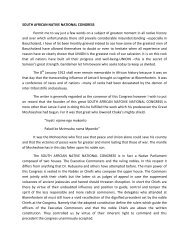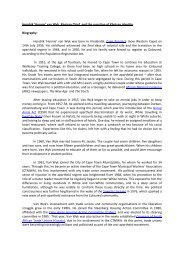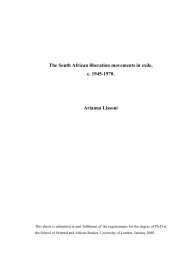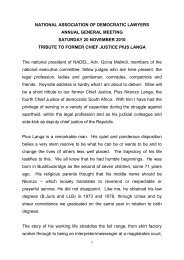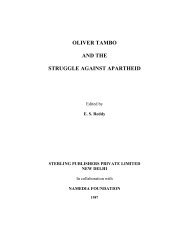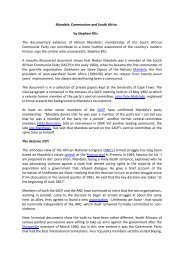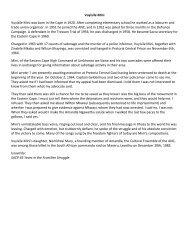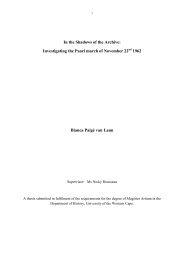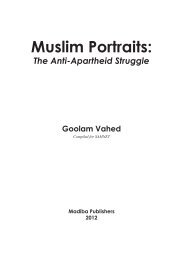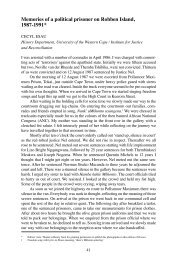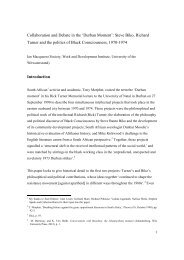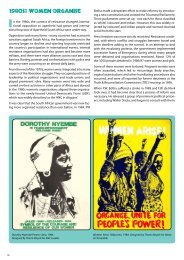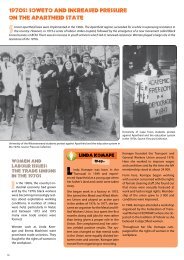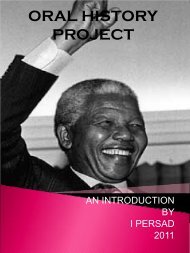Celebrating Women - South African History Online
Celebrating Women - South African History Online
Celebrating Women - South African History Online
You also want an ePaper? Increase the reach of your titles
YUMPU automatically turns print PDFs into web optimized ePapers that Google loves.
Multi-Party Negotiating Forum - On April 2, 1993, the<br />
Multi-Party Negotiation Process (MPNP) began in Kempton<br />
Park outside Johannesburg. It laid the foundations for an<br />
interim constitution that governed the country through<br />
the 1994 elections up to the adoption of a new constitution<br />
in 1996.<br />
National Party (NP) - Afrikaner nationalist party that won<br />
the 1948 elections that ushered in Apartheid. The party lost<br />
power to the ANC in 1994, returned in 1997 as the “New<br />
National Party,” and was then dissolved in 2005.<br />
Nationalism - Strong adherence to one’s nation and national<br />
identity.<br />
Pan-<strong>African</strong>ist Congress (PAC) - Founded in 1959 in a split<br />
from the <strong>African</strong> National Congress. The PAC rejected the<br />
ANC’s non-racial policies and promoted <strong>African</strong> Nationalism<br />
and more mass action. It formed a militant wing, called<br />
Poqo, after the Sharpeville massacre and worked both in<br />
exile and underground within <strong>South</strong> Africa.<br />
Pass - (also known as a dompas) Identification papers for<br />
<strong>African</strong> men and women with racial classification and other<br />
personal information, including employment status and<br />
history. The government used passes to restrict movement<br />
of black people. Passes criminalized millions of ordinary<br />
<strong>South</strong> <strong>African</strong>s.<br />
Pretoria Minute - Resolution of August 6, 1990 affirming<br />
the Groote Schuur Minute and setting out terms for further<br />
negotiations.<br />
Record of Understanding - In 1992, Nelson Mandela and<br />
F.W. de Klerk signed the Record of Understanding: a promise<br />
to resume formal investigations. In addition, the document<br />
set a time table for the release of prisoners, a ban on<br />
dangerous weapons, fencing for hostels, and provided for<br />
the creation of an elected constitutional assembly to develop<br />
a new constitution for <strong>South</strong> Africa.<br />
<strong>South</strong> <strong>African</strong> Communist Party (SACP) - Known as the<br />
Communist Party of <strong>South</strong> Africa (CPSA) from 1921-1953,<br />
it initially focused on the cause of white workers. By the<br />
late 1920s, it was oriented to the needs of black workers.<br />
The CPSA was declared illegal in 1950 and reformed as the<br />
<strong>South</strong> <strong>African</strong> Communist Party (SACP) in 1953. The SACP is<br />
now part of the “Tripartite Alliance” with the <strong>African</strong> National<br />
Congress and Congress of <strong>South</strong> <strong>African</strong> Trade Unions<br />
(COSATU).<br />
<strong>South</strong> <strong>African</strong> Congress of Trade Unions (SACTU) - Founded<br />
in 1955 as a critical response to the decision of the Trade<br />
Union Congress of <strong>South</strong> Africa to restrict its membership<br />
to non-<strong>African</strong> unions. SACTU gained vast membership as<br />
the labour wing of the Congress Alliance.<br />
<strong>South</strong> <strong>African</strong> Indian Congress (SAIC) - Established in May<br />
1923 by a coalition of political organizations aimed at promoting<br />
Indian rights in Natal and the rest of <strong>South</strong> Africa.<br />
During apartheid, the SAIC cooperated with the <strong>African</strong> National<br />
Congress, jointly launching the Defiance Campaign<br />
of 1952 and joining the Congress Alliance.<br />
<strong>South</strong> <strong>African</strong> Students Organization (SASO) - A Black<br />
Consciousness organization of black university students<br />
formed in 1969, with Steve Biko as its first president. SASO<br />
helped form the Black Peoples Convention in 1972.<br />
Total strategy - Policy of the Apartheid regime developed<br />
in the late 1970s under the leadership of P.W. Botha. Aimed<br />
to respond to a perceived “total onslaught” on <strong>South</strong> Africa<br />
by Communists and the international community seeking<br />
to undermine apartheid. Military campaigns destabilized<br />
neighbouring countries and armed force was used to repress<br />
dissent in <strong>South</strong> Africa. Botha also initiated some political<br />
reforms that tinkered with apartheid but maintained<br />
white supremacy.<br />
Township - Black residential areas on the outskirts of <strong>South</strong><br />
<strong>African</strong> cities created by the Apartheid government.<br />
Transitional Executive Council - A council formed in 1993<br />
to oversee the transition from Apartheid to democracy. This<br />
process included the formation of an interim government,<br />
setting the terms for the 1994 election, and changing the<br />
<strong>South</strong> <strong>African</strong> flag and national anthem.<br />
Truth and Reconciliation Commission (TRC) - Government<br />
body created by the Promotion of National Unity and<br />
Reconciliation Act of 1995 for the purpose of investigating<br />
politically motivated human rights violations committed<br />
from 1960-1994. Victims and perpetrators of human rights<br />
violations testified before the commission, often in public<br />
hearings. Amnesty was granted to applicants if two criteria<br />
were met: (1) the crimes were politically motivated, and (2)<br />
the applicant was fully truthful.<br />
Umkhonto we Sizwe (MK) - Armed wing of the <strong>African</strong> National<br />
Congress established in 1961 to force the Apartheid<br />
regime to the bargaining table through acts of sabotage<br />
and, if necessary, military campaigns.<br />
United Democratic Front (UDF) - Founded in 1983 as an<br />
umbrella body that unified numerous unions, and youth,<br />
religious, civic, and sport organizations to oppose apartheid.<br />
It was initially founded to protest the introduction of<br />
the Tricameral Constitution. It affiliated with the ANC and<br />
led mass protests and boycotts throughout the 1980s. It<br />
disbanded in 1991.<br />
41



